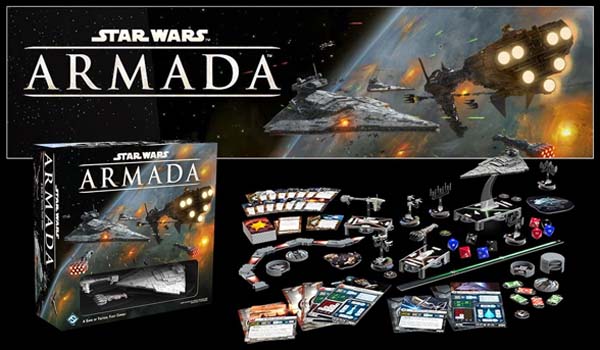
If you like the Star Wars: X-Wing miniatures game (and I do like it), or if you're eagerly awaiting the release of the second edition, but you don't want to house-rule that your car can act as a makeshift Star Destroyer, then Fantasy Flight has you covered. Star Wars: Armada is a higher-scale, tactical combat game using capital ships, and it might actually be a considerably better game than the core X-Wing set (at least better than the first edition)!
Planning ahead
Much like the board game Sails of Glory (which I also really like), Armada requires you to plan the actions of your capital ships a couple turns in advance. However, unlike Sails of Glory, it isn't the movement of these ships that you must pre-plan; it's their desired "commands". I was a little disappointed that the capital ships don't require that players plan their movement in advance, but then again, the maneuverability of these ships is highly limited, and only gets lower as the ship goes faster (if the ship in question even can go faster). There is a sense of inertia to these behemoth ships, but not quite the same level of inertia as the sailing ships of Sails of Glory.
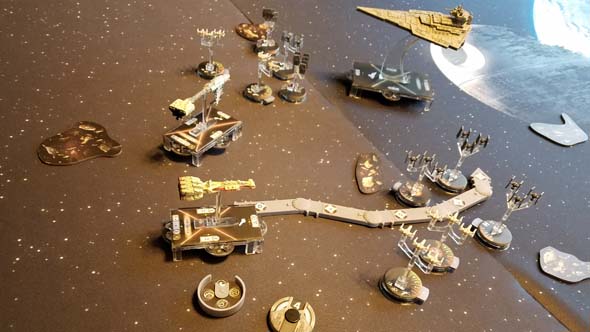
Ships move very slowly and have very limited maneuverability.
I do like that these ships both begin and end their movement relative to the font of their base. This alleviates the problems that X-Wing had with its large ships counter-intuitively moving faster than their smaller counterparts. And since the base Armada package comes with ships of varying sizes, this improvement is immediately noticeable without needing to wait for expansions: all ships move and turn at consistent speeds.
The rules do require that ships attack prior to moving. This means that you must plan ahead a little bit, since you have to position yourself for an attack in the turn prior, and have to anticipate who will have initiative and where their ship(s) will be if they get to move them before you get to make your attack.
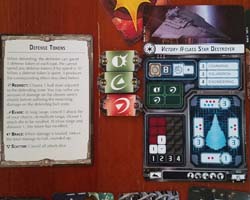
Defense tokens give players
more meaningful decisions.
More meaningful decisions
Even defense is a tactical decision! And this might be the single, best change from X-Wing. Instead of simply rolling defense dice to cancel out your opponent's attack rolls, you get to chose a set of defense tokens to apply, and each one mitigates damage in different ways. One defense token may allow you to cancel out an opponent's die roll, while another will allow you to redirect the damage to another hull section's shields, and yet another halves the total damage dealt. These tokens refresh each round, unless you use twice in the same round, in which case, it is permanently discarded.
This alleviates another of the problems that permeated X-Wing: that damaging an opponent often felt like playing craps. Getting into perfect position and lining up a point-blank shot against an opponent can be completely foiled by dice rolls in X-Wing. Dice still play a role in Armada, but damage seems to be much more consistently-dealt, and players actually have a say in how their ships defend themselves from damage. It gives the player more meaningful decisions... [More]
42a5d29c-7cc8-476d-8c33-ac96b6f42b8b|0|.0
Tags:Star Wars, Star Wars: Armada, Fantasy Flight, board game, miniatures game, capital ship, squadron, weapon arc, dice, maneuver, objective, James Kniffen, Christian T. Petersen
Another summer, another onslaught of comic book movies. This year, we're spared the misery of another of Warner's DC Comic movies, so we get two Marvel movies (including the recently-released Infinity War and the soon-to-be-released Ant Man and the Wasp), and we get a sequel to Fox's Deadpool. The first Deadpool was pretty great, even though it wasn't as groundbreaking as it seemed to think it was. Nevertheless, it was thoroughly entertaining, and the sequel follows suit.
I do think that the first movie's humor is executed much better though, as the sequel frequently fell flat for me. That isn't for lack of trying though. Deadpool 2 almost tries too hard. The jokes come fast and relentless. A lot of them fall flat, but the volume of attempts is so high that the audience the audience is chuckling or laughing every couple minutes. It's almost a "Barney Stinson" approach to joke-telling: if you tell enough, at least some of them will work. Then again, it might also be different jokes for different people.
I rarely ever found myself laughing out loud during this movie. I laughed out loud to a few jokes in the first movie, but hardly anything in this one. It was a lot more quietly chuckling to myself or nodding along that "Ah, I get it". At least there weren't quite as many contemporary pop culture references this time around (which means this movie will probably age better than the first one will), as more of the jokes were at the expense of comic book movies and comic books in general. Since I didn't read X-Men too extensively, a lot of it probably just went over my head.
I only found myself laughing at a small fraction of the jokes, including the extended X-Force gag.
Again, Deadpool takes a lot of shots at the studio, complaining once again about the lower budget of the movie and the lack of any recognizable X-Men. He asks if Cable is from the DC Universe because Cable is so dark and brooding, and he takes several other shots at Batman v Superman and Justice League. He also takes a couple shots at Marvel Studios, including referring to Cable as Thanos.
Is the crappy quality of the CGI villain intentional? Is that supposed to be a joke? If so, does that justify the dated CG that was used?
Cable and Deadpool play off each other really well.
It's hard to tell if other signs of uninspired writing are deliberate jokes, or just examples of uninspired writing, especially since Deadpool quips once or twice about the movie's lazy writing. For example, does it really make sense that Deadpool and Cable are trying to stop Firefist from going on a killing spree, even though Deadpool and Cable kill literally everyone in their path to do so? Wouldn't that just reinforce in Firefist's mind that killing is acceptable? [More]
1d222fa4-8ba2-4dee-8919-c8dd6300d008|0|.0
Tags:Deadpool, X-Men, 20th Century Fox, Ryan Reynolds, Josh Brolin, Zazie Beetz, Morena Baccarin, Cable, Colossus, Negasonic Teenage Warhead, Domino, Firefist, Juggernaut, X-Force, R-rating, violence, mutant, Marvel, Marvel Comics, comic book, Wolverine, Logan, time travel, fourth wall
Movie audiences were all pleasantly surprised when the ensemble cast of Avengers all came together to make a pretty damned good movie. There was genuine anxiety regarding whether that movie could possibly successfully bring four movies' worth of superheroes together into a single movie, and manage to give everybody enough valuable screen time to make the whole thing work. Similarly, there was considerably anxiety regarding whether or not Marvel could double-down and pull off an ensemble of ensembles for the mega-crossover Infinity War. But at this point, I think we've all moved past any expectation that Marvel will screw up, and we all just assume that they're going to find a way to magically make it all work.
I had to wait a couple weeks to find out. I had planned to see the movie the Monday after release and have this review out two weeks ago, but fate conspired against that. Towards the end of the trailers, somebody pulled the fire alarm in the building, forcing the theater to evacuate. It was a false alarm, but by the time they let everyone back in, it was too late and the movie wouldn't be over in time to pick up the kids from KidsQuest before they closed for the night. Ah well. My girlfriend finally got sick of having to hush her students whenever they started talking about the movie, so she dragged me out to the theater earlier this week.
The sheer volume of characters, content, and punches here does make Infinity War one of the more unbalanced of Marvel's movies. It is after all, weaving a complex tapestry of superhero action, science fiction, and magical fantasy, and there's virtually no set-up or development for the characters. This movie is all climax all the time. It's probably the first Marvel movie that really requires that you have seen most of the lead-up material. There simply isn't enough time here to introduce who everyone is and what their deal is. If you haven't seen at least one film featuring each character, you'll likely be lost with regard to who they are. Guardians of the Galaxy, Civil War, and Ragnarok are pretty much essential prerequisite viewing. You can skip Ant Man though, as he's conspicuously absent from this particular compilation piece.
Infinity War is an ensemble of ensembles.
This movie would probably fail miserably if it were a typical super-hero movie focused around the heroes and their struggle (and failure) to beat the bad guy. Marvel knows well enough to not try to replicate The Empire Strikes Back. Instead, Infinity War is much more about the bad guy. Thanos is pretty much the main character here, and a great deal of time and effort is paid to trying to make him as relatable and understandable of a villain as possible. He is characterized with nuance, he's clever, he's ruthless, and he's consistent in his goals and ambition. Whether or not you sympathize with his point of view will, of course, depend on where you stand on the topic of universal genocide. Josh Brolin's Thanos does, however, have some pretty definitive swagger and charisma. His CG monstrosity has a lot of screen presence. It's too bad that the CG isn't always completely convincing though.
Because the bad guy is basically the main character (and protagonist), the entire narrative arc of the movie is almost the inverse of what you'd usually expect. The bad guys show up to create the dramatic stakes and sense of threat with aplomb, as expected. But instead of the rising action being a series of setbacks for the heroes with a climactic victory at the end, the heroes seem to come together and get everything mostly under control for the middle act of the movie, only to have it all go to shit when the climax arrives. Instead of the good guys losing in the end, the movie is framed as the bad guy wins in the end -- a subtle, but significant difference!
Thanos is the main character of this movie, and the dramatic and emotional arcs revolve around him. [More]
7dc53586-7b85-4f1e-a055-7269ce51614f|0|.0
Tags:Avengers, Avengers: Infinity War, Marvel, Marvel Comics, Disney, McGuffin, Josh Brolin, Thanos, Iron Man, Captain America, Thor, Hulk, Black Widow, Loki, Starlord, Gamora, Groot, Rocket Racoon, Drax, Black Panther, Wakanda, Winter Soldier, Scarlet Witch, Vision, Doctor Strange, Spider-Man, Infinity Stone, Infinity Gauntlet, space, magic, comic book
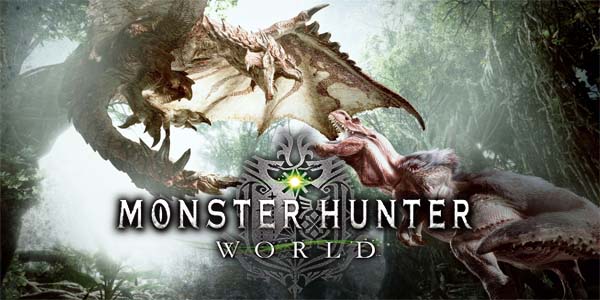
I've been playing Monster Hunter: World off-and-on since it was released (which was a few months ago at this point), and I'm still just not sure that I get it yet. The game just hasn't clicked for me. Maybe I haven't invested quite enough time yet. In the past, I've come around to games that initially turned me off with their tedium and/or difficulty. Demon's Souls is perhaps the prime example, as that game took a few days (almost a week) of banging my head against the walls of the Boletarian Palace before things started to click for me. It certainly didn't take months! Once Demon's Souls started to click, the game almost immediately became one of my all-time favorites.
The Demon's Souls comparison is apt. Corners of the internet keep insisting that Monster Hunter: World is a game that should appeal to the same types of players who love Dark Souls (because everybody keeps forgetting that Demon's Souls did it first and better). Well, I'm sorry, but I just don't see how the two connect.
Yeah, there's the difficulty. But Dark Souls isn't good because it's hard. It's good because all the pieces around that central challenge make overcoming that challenge feel worthwhile. It's the world-building, the lore, the way that the obtuse characters and dialogue builds a growing sense of intrigue about the world, the sense of nervously tip-toeing into a dangerous unknown, the sense of leveling your stats into a character build that perfectly suits your desired playstyle, and that ominous sense of entropic dread that permeates every nook and cranny of the game. Those things make Dark Souls good! Those sorts of things are lacking in Monster Hunter: World.
The JRPG nonsense that usually turns me off of JRPGs
Sadly, Monster Hunter: World is bogged down by a lot of the kinds of JRPG nonsense that has frequently turned me off of playing these sorts of games. While I often appreciate that JRPGs tend to be more story and character-driven (something that I often wish western RPGs would focus more on), JRPGs also tend to undercut the seriousness of the stories they're trying to tell with lots of silliness and whimsy. Sometimes it's charming or endearing; other times it's juvenile or obnoxious.
You can track monsters by following their footprints or by studying their snot and turds.
I can tolerate this game's silly little cat side kicks. Monster Hunter's whimsical fantasy setting works well enough. What is less tolerable is that the game is littered with tedious, grindy, time-killer quests: harvest so many mushrooms, investigate a bunch of dinosaur footprints and [literal] crap, kill however many small monsters, capture yet more small monsters. and yadda yadda yadda. I guess, at a certain level, these activities make a certain amount of sense. Your character is, after all, one grunt in a whole army of grunt hunters being sent out to do the dirty work of the captains. But I have better things to do in real life than to wander around a forest picking flowers for 50 minutes.
Monster Hunter is loaded with grind quests.
Some of these sorts of quests are relegated to little ambient side-quests that you can perform while you're doing other major missions. These are the ones that are tolerable. Others (like the Investigations and other tangential story quests) require you to perform dedicated ingredient-gathering grind missions, in which the sole purpose of the mission is to fight monsters you've already fought and collect a bunch of stuff. Since my character doesn't have traditional stats or levels that improve as I complete these quests, the grinding just never really feels worth it.
I was hoping that I could just power through the main quests and skip all the tedious grind stuff. No such luck. I got to a point where I had to hunt the T-Rex-like Anjanath, and got stuck... [More]
1b9f660c-f850-4553-965f-73076071e14f|3|3.0
Tags:Monster Hunter, Monster Hunter: World, Capcom, JRPG, RPG, dinosaur, dragon, palico, cat, pet, monster, grinding, time limit, hunt, nature, research, ecosystem, food chain, asynchronous multiplayer
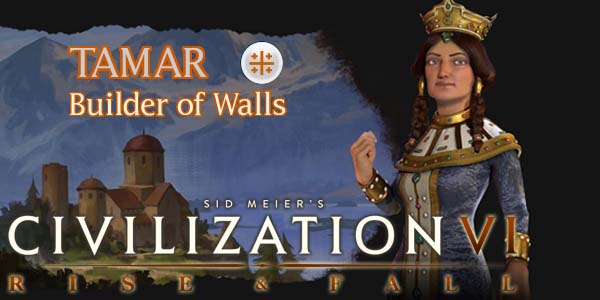
Civilization VI's first expansion, Rise & Fall released a couple months ago, and it introduced a few leaders and civilizations that are making their first appearance in the franchise. I hope to be able to write strategies for every one of the expansion civs and leaders, but I'm going to start with the ones that are new to the franchise, and the ones that most utilize the expansion's new features (Era Score, governors, loyalty, and so on). The first civilization that I will tackle will be the Georgian civilization, lead by Queen Tamar.
The feuding Georgian kingdoms in the Caucusus were first united under Bagrat III between 1008 and 1010 AD, after he tricked his cousins (the heads of feuding houses) into a false reconciliatory meeting, only to throw them into prison and ensure that his son would become heir to the kingdom. A few years later, however, that son would become a prisoner of the Byzantines as part of a peace deal after Bagrat's failed attempt to reclaim the ancestral city of Tao from the Eastern Roman Empire.
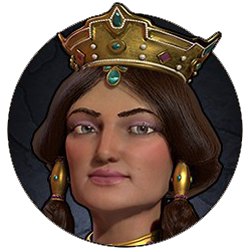
The Georgian empire reached its height under the rules of King David IV and Queen Tamar in the 12th and 13th centuries. These monarchs took advantage of the decline in Byzantine power and filled the power vacuum by claiming lands lost by the Byzantines. During this time, art and literature flourished, and Georgia developed its own architectural styles. Ecclesiastic art was dominant, but this period also saw some of the first major secular works of art and literature. This period would eventually become known as the Georgian Renaissance (or "Eastern Renaissance"). The renaissance continued under Tamar's rule, who proved adept at statecraft. She mediated internal tensions within her kingdom, and even thwarted a coup by her Russian husband, all the while protecting her kingdom from Turkish invasions and claiming Muslim lands to the east and south.
The Kingdom of Georgia's golden age would eventually come to an end at the hands of invading Mongols in the 13th century. The kingdom would be fractured, and the ensuing Black Death would ensure that Georgia would never again reach its former glory.
DISCLAIMER:
Civilization VI is still very early in its life-cycle (particularly the Rise & Fall expansion. Strategies for the game (and for specific leaders and civs) may change as Firaxis applies balance patches, introduces new features, or expands the game through further DLC or expansion packs, or as the Civ community discovers new strategies or exploits. As such, the following strategy guide may change from time to time. I will try to keep it up-to-date, and will make notations whenever changes are made. I'll also post links in the official 2K forums and CivFanatics, where I'll also report any changes made. If possible and practical, I will try to retain the original content of the strategy for posterity.
I welcome any feedback or suggestions that readers wish to offer. Feel free to post on the linked forums, or by posting a comment at the bottom of the page.
This guide is up to date as of the March 2018 patch (ver. 1.0.0.229)
In Civilization VI: Rise & Fall, Georgia is a defensive and religious civilization that thrives in its golden ages. Tamar is a bit of a religious world policewoman who builds strong relationships with city states that share her faith, and who will aggressively protect her city state allies. [More]
851c8f8a-f6ab-4afc-92d8-5eafc6a09aa4|0|.0
Tags:Sid Meier's Civilization, Civilization VI, Georgia, Tamar, strength in unity, glory of the world kingdom and faith, Narikala Fotress, Tsikhe, Khevsur, protectorate war, casus beli, city state, suzerain, envoy, religion, faith, golden age, era score, unique building, unique melee unit
|

| 12 | | | | | | | 60 | | 11 | | | | | | | 55 | | 10 | | | | | | | 50 | | 09 | | | | | | | 45 | | 08 | | | | | | | 40 | | 07 | | | | | | | 35 | | 06 | | | | | | | 30 | | 05 | | | | | | | 25 | | 04 | | | | | | | 20 | | 03 | | | | | | | 15 | | 02 | | | | | | | 10 | | 01 | | | | | | | 05 |
|